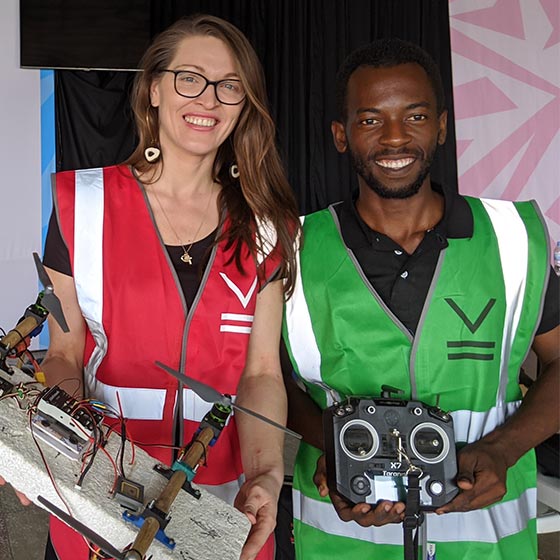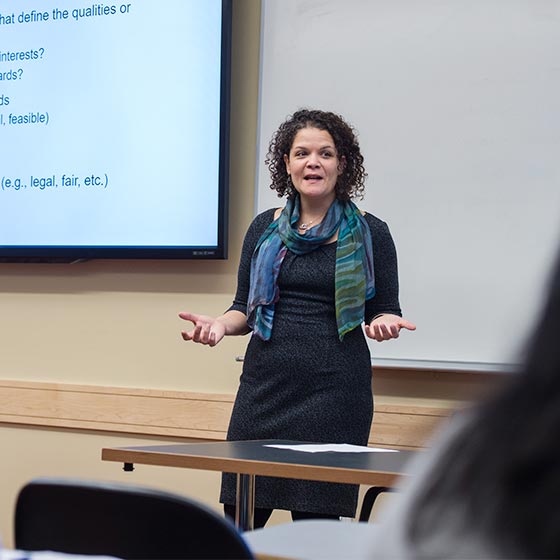
Data Analytics for Public Policy
Technology generates tremendous amounts of real-time data. Computer algorithms and sophisticated metrics help convert this data to help inform policy and improve delivery of government services. Learn to turn data into actionable insights that move communities forward and prepare to meet the increasing employer demand for professionals with expertise in extracting, storing, managing and utilizing data to inform decision making.
Recent graduates secured jobs as data scientists for some of these organizations: The World Bank, NYC Department of Education, U.S. Government Accountability Office, UN Women and Chicago Poverty Lab.
Related Data Analytics for Public Policy Courses
Public Administration
- Data-Driven Decision Making
- Public Policy and Program Evaluation
- Policy and Decision Analysis
- Public Sector Predictive Analysis
Geography and the Environment
- Geographic Information Systems
- GIS for Urban Environments
- Environmental Geostatistics
School of Information Studies
- Natural Language Processing
- Big Data Analytics
- Information Visualization
- Text Mining
Go further with a certificate in Data Analytics
Environmental Policy and Administration
Gain expertise in the administrative, political and legal challenges facing policy makers in energy and the environment.
There is an unprecedented need for managerial expertise in this field. According to the Bureau of Labor Statistics, employment in environmental science is projected to grow 8 percent from 2019 to 2029, faster than average for all occupations.
Our alumni hold leadership positions in a range of contexts:
- Environmental Protection Specialist, U.S. Dept. of Energy
- Special Agent, U.S. Environmental Protection Agency
- Secretary, Dept. of Natural Resources, State of Delaware
- Chief Sustainability Officer, Carrier Corporation
- President and CEO, National Wildlife Federation

Related Environmental Policy and Administration Courses
Public Administration
- Smart Grid: Security, Privacy, Economics
- Climate Change: Security, Policy, and Economics
- Science, Technology and Public Policy
- Energy, Environment and Resources Policy
- Economics of Environmental Policy
SUNY ESF
- Foundations of Environmental Studies
- Environmental Advocacy Campaigns and Conflict Resolution
- Environmental Thought and Ethics
- Environmental Policy Analysis
- Natural Resources Policy
- Resource and Environmental Economics
- Ecotourism and Nature Tourism
College of Law
- Environmental Law and Policy
- Land Use Planning & Zoning Law

International Development Administration
Learn the factors that distinguish administrative systems in a wide variety of countries—both developed and developing; investigate the behavioral and policy patterns these factors give rise to; and examine a range of economic, social, political
and managerial actions for overcoming obstacles and promoting trade and development.
Graduates who focused on this area have gone on to careers at the following organizations, among many others:
- USAID
- Bill and Melinda Gates Foundation
- International Committee of the Red Cross
- UN Office for the Coordination of Humanitarian Assistance
- UNICEF
International Development Administration Courses
Public Administration and International Affairs (PAIA)
- Fundamentals of Post-Conflict Reconstruction
- International Development Policy and Administration
- Economics of Development
- NGO Management in Developing and Transitional Countries
- UN Organizations: Structure and Function
- Humanitarian Action: Challenges, Responses and Results
Other Maxwell and College of Law
Anthropology
- Global Health
Geography and the Environment
- Water: Environment, Society, Politics
College of Law
- International Law
- International Human Rights
National and International Security Policy
The field of security requires government agencies and administrators to be nimble and forward thinking, with well-honed technical skills such as data analysis and GIS; social science skills such as policy analysis; and knowledge of history and international relations. Leaders and managers need to be able to adapt to evolving borders, leadership, actors, policies and norms at the same time communications, intelligence gathering and defense technologies—i.e., artificial intelligence, machine learning, blockchain, robotics—advance at an ever-accelerating rate.
Graduates are prepared to address contemporary security concerns that affect the economy, environment, food, health, technology, law and governance, and communications. They work at the Dept. of Defense, Defense Intelligence Agency, Federal Bureau of Investigations, U.S. Department of State, and a variety of international governments and agencies.

National and International Security Policy Courses
Public Administration and International Affairs
- Contemporary US-Mexico Relations
- Central Challenges in National Security Law & Policy
- Follow the Money: Key Issues in Illicit Finance
- U.S. National Security and Foreign Policy
- Fundamentals of Post-Conflict Reconstruction
- U.S. Intelligence Community: Governance & Practice
- U.S. Defense Strategy
College of Law
- National Security Law
- International Law
- International Human Rights
- Counterterrorism and the Law
- National Security Research Center
- Cyber Security Law and Policy
Go further with a certificate in Security Studies

Public and Nonprofit Managements
Develop broad-based analytical and managerial expertise necessary for a successful career as an administrator and manager at any level of government and in nonprofit organizations.
Students build knowledge of the tools of governance; organizational management theories and practices; managing individuals, groups and teams; oversight and accountability; the role of technology and information; and collaborative public management, negotiation and conflict resolution.
Graduates hold positions of leadership across levels of government and nonprofit arenas including the following, among many others:
- Boys and Girls Clubs of America
- City of Arizona
- Smithsonian National Zoological Park
- United Way
Public and Nonprofit Management Courses
Public Administration and International Affairs
- Data Driven Management
- Financial Management in State & Local Governments
- Metropolitan Government & Politics
- Ethics & Public Policy
- Human Resources Management
- Financial Management of Nonprofit Organizations
- Managing Individual, Group, & Systemic Conflict
- NGO Management in Developing and Transitional Countries
- Public Management of Technological Development
- Policy Design and Implementation
Other Maxwell and College of Law
Anthropology
- Negotiation: Theory and Practice
College of Law
- Administrative Law
- Labor and Employment Law

Public and Nonprofit Excellence
In addition to earning the high regard of its peers in the overall Public Affairs category, the Maxwell School ranks #1 in the Public Management and Leadership subspecialty and #2 in the Non-Profit Management subspecialty. In fact, in the 2023 rankings, the School was highly rated across 10 specialties—an indication of both breadth and depth.

Social Policy (Aging, Education, Health, Welfare)
Address issues related to distributional equity and equality, particularly for those least able to help themselves in a market society, such as children, people with disabilities, and the elderly, sick and unemployed.
Students examine the roles and responsibilities of the public sector in designing, managing and evaluating health, education and welfare programs for at-risk populations, as well as program implementation in the public, private and nonprofit
sectors.
Recent graduates obtained positions in organizations such as:
- U.S. Department of Health and Human Services
- U.S. Department of Labor
- New York Department of Public Health
- Urban Institute
Social Policy Courses
Social Policy Courses
- State and Local Government Public Finance
- Health Economics and Policy
- Public Policy and Program Evaluation
- Social Welfare Policy
- Changing American Healthcare System
- Education Policy
- Policy Design and Implementation
- Demography, Aging and Policy
College of Law
- Family Law
- Disability Law
- Refugee and Asylum Law
State and Local Government Financial Analysis and Management
Gain knowledge of the fiscal issues confronting administrators and policymakers in state and local government, while learning technical skills required of professionals to work in budget and finance offices, legislative agencies, and organizations associated
with state and local finance.
Graduates of this area of study obtain budgeting and finance positions in state and local governments, federal agencies, public interest groups, professional organizations and private sector organizations, including among many others:
- Budget Offices of Arizona, New York and Illinois
- City management positions
- Private consultants Booz Allen Hamilton, Deloitte and Grant Thornton
- Congressional Budget Office, U.S. Government Accounting Office, U.S. Social Security Administration

State and Local Government Courses
Public Administration and International Affairs
- Public Budgeting
- Financial Management in State and Local Governments
- State and Local Government Finance
- Urban Policy
- Metropolitan Government and Politics
- Managing Individual/Group/Systemic Conflicts
- Education Policy
- Public Administration and Law
- Regulatory Law and Policy
- Ethics and Public Policy
- Tax Policy and Politics
Public Administration, Continued
- The Federal Budget, Health Care, and Social Security Reform
- Health Economics and Policy
- Technological Innovation in the Public Sector
- Human Resources Management
Other Maxwell and Syracuse College of Law
- Public Expenditures
- Public Finance
- Pension and Employee Benefit Law
Impactful policy-relevant research
The Maxwell School is home to 14 interdisciplinary research centers, each focused on a topical area in public affairs. With faculty and students from different departments and disciplines co-located within the centers, each serves as an incubator for innovative research and experiential learning that connects and catalyzes our foci.
Collaborative research to address today's policy challenges.
